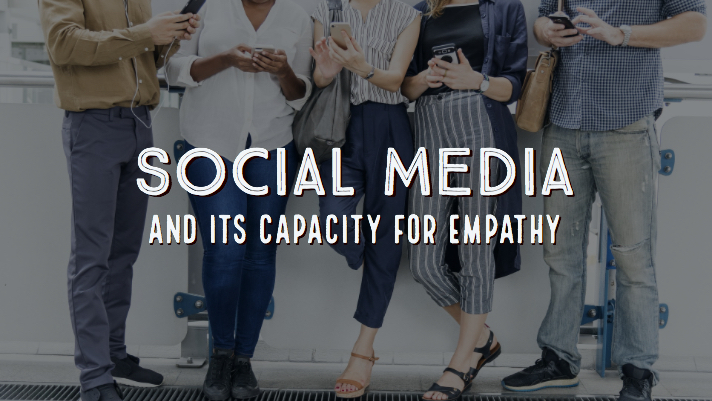Social Media and its Capacity For Empathy (Sponsored Post)

Bio: As a Research and Innovation Consultant, my job is to take on a balance of responsibilities that are all designed to guide and grow the brands and companies we serve. By using my capabilities as a writer, researcher, observer, and interviewer, my research approach is to bring teams and partners alongside the journey with their consumers, encouraging them to push boundaries beyond the surface level and uncover the deeper truth of each human story.
As the world of social media takes such a strong precedent in our lives, the conversations we may have in-person are changing, too. Our exchanges that take place in person are becoming much more fast-paced and transactional, and the way we communicate on social media is becoming the more familiar way to connect on a deeper level.
These days, there seems to be big questions around the capacity social media has for empathy: Is it something that connects us to each other? Or is it something that pulls us apart?
In my own experience, I’ve often gone back and forth between the answer to this question. One day I’ll think to myself, “Social media feels like mindless chatter” and I think about how many details we miss from being in-person when we’re simply scrolling through our phones. However, there are other times where I may read someone’s story they openly shared in a post; I’ll think to myself, “Wow. I feel the same way -- I had no idea that others felt this way, too.” This can then lead to an even deeper conversation with a complete stranger… right through the phone, I was just rejecting!
What I’m learning is that social media can both connect and disconnect us; this is really dependent on how we use it and what we’re looking for.
Author and Psychologist Jamil Zaki discusses his thoughts on the subject as he was featured on an episode of the NPR podcast Hidden Brain: The Empathy Gym. In his own research, he shares how some “studies suggest that anonymous interactions do not favor empathy” and as humans progress into a more solitary way of living, this “might have an effect on our empathy,” as well.
But what Zaki and I both believe is that this isn’t necessarily true.
In one of our most common digital research methodologies, #NOFILTER, we use empathy to approach social listening, taking us beyond the surface of a post - diving deeper into the lives of the people sharing their thoughts, feelings, and stories across various channels of the internet.
One of my most recent research topics was to understand how people suffering from a severe form of depression and an indication of suicide were talking about their stories online.
What we found from running this initial search is that while people aren’t openly telling these stories on their own personal profiles, that doesn’t mean they aren’t telling these stories at all. Instead, we uncovered hundreds and thousands of stories being told on platforms that kept people anonymous but allowed them a safe form of connection, understanding, and help. Social media was a partner in giving these individuals who are in such severe suffering the ability to feel seen and heard from complete strangers.
During the episode of Hidden Brain: The Empathy Gym, Zaki was asked the question, “Are there reasons to imagine the connections we have online are attributing to the decline in empathy?”
He responds, “I don’t think of [the internet and social media] as inherently anti-social. In a way, you can think of it as humanity’s greatest empathic opportunity ever. We have the chance to connect with people around the world on their own time at any terms. And with great compassion.”
Through our #nofilter approach, these are often the types of conversations we are paying close attention to. We aren’t just looking for the comment that has your brand or product or category in it - we’re looking at the context. We’re looking at how others reacted or responded. We’re looking for why people share, where they share, and what deeper reasons fall behind their motivations to share with others. And the more connections individuals have online, the more we can continue to understand their stories as humans first.
It’s strange to think that anonymity could be the way humans are discovering a whole world of people who understand us the most. Now more than ever, social media is creating a place where we can now experience these kinds of connections we might not have ever had before.

